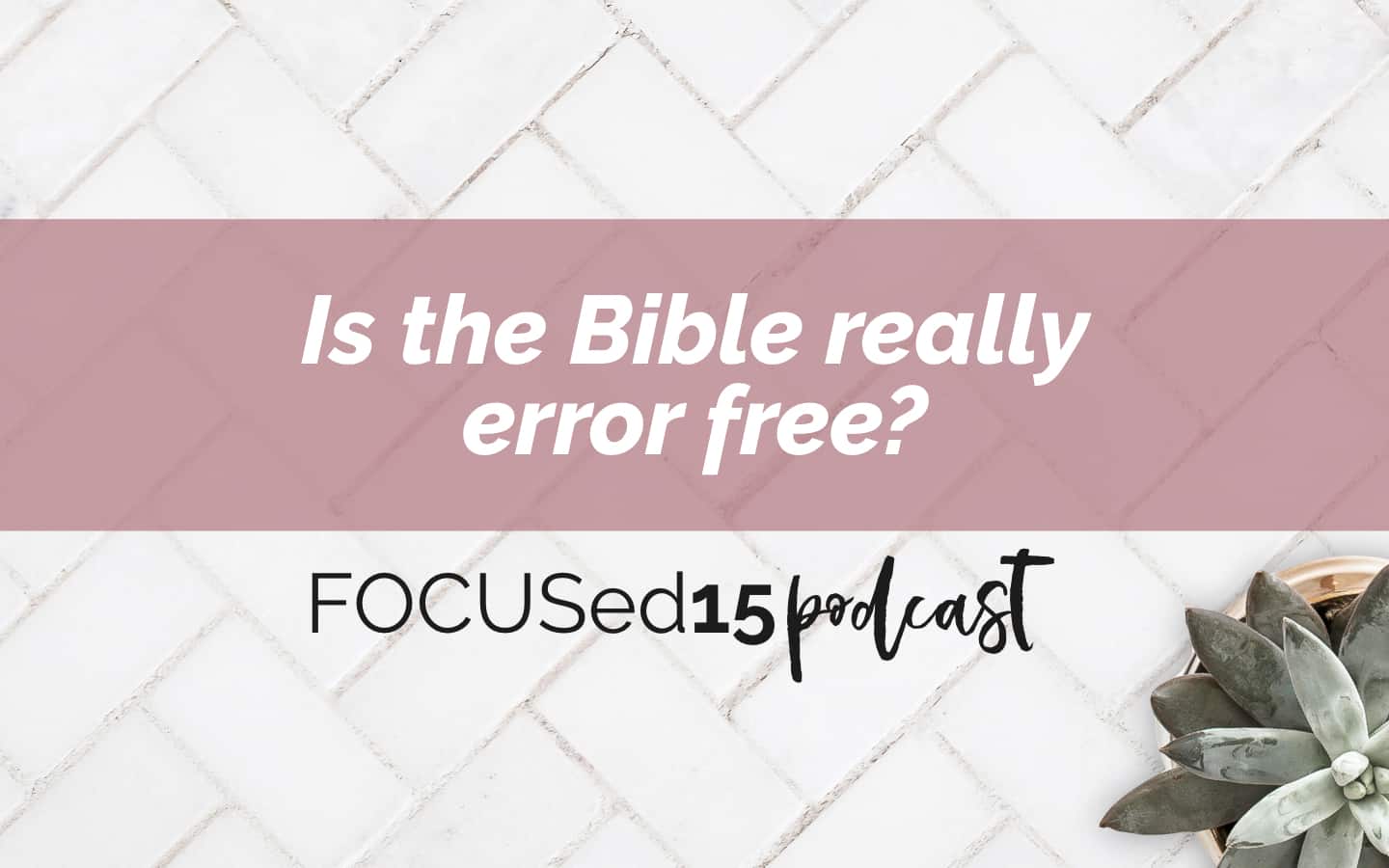FOCUSed15 Christian Podcast – Season 3 – Episode 8
For some of you, your answer to this question may be a no-brainer. Or, maybe you are currently wading through theological waters to find the answer to this question. Either way it is important not only for you to know your answer to this question but also WHY. In this quick podcast episode, Chris and I chat about whether or not the Bible is really error free.
IN THIS EPISODE YOU’LL HEAR ABOUT:
- Whether or not the Bible claims to be error free
- What to do with the supposed errors in the Bible
- An example of how Katie came across a passage that didn’t seem to line up and looked inaccurate
- Three reasons to hold tightly to the inerrancy of Scripture
RECOMMENDED RESOURCES:
Links below may include affiliate links. At no additional cost to you, I receive a small portion of your purchase. Thanks!
- Are there errors in the Bible? – This brief article from NAMB gives quick explanations for 16 different categories of supposed errors.
- What is Inerrancy? A quick and helpful Ask Pastor John audio interview.
- Bible Doctrine by Wayne Grudem – This is a resource packed with loads more than just info about Biblical inerrancy.
- Is Inerrancy a Historical Doctrine? In this video interview, Keith Whitfield sits down with Nathan Finn to talk about inerrancy and church history.A helpful look at the understanding of inerrancy throughout church history
HOW TO LISTEN TO THIS PODCAST:
You have many options for listening in. Simply choose your favorite from below.
1. Listen right here on the blog.
2. Listen from an app on your smartphone, iPad or iPod– For iDevice users, click here to access the podcast and subscribe in iTunes. If you don’t have an Apple device, you can listen with the Stitcher app. You’ll have access to new episodes on either app as soon as they are published.
3. Listen from your computer via iTunes or Stitcher. Just click here to access the podcast in iTunes or here to listen from the Stitcher website. Once you subscribe to the podcast, new episodes will show up in your iTunes and/or Stitcher dashboard.


This is a really great podcast and very informative! I have another question: what would you and Pastor Chris have to say about those who believe that the King James Bible is the true, inerrant word of God and the other “new versions” or translations are full of errors? I attended a conference once that centered on the KJV and how the NIV and other translations are full of errors, water-down God’s Word by changing words to soften it and ultimately contradict themselves.
Thanks for the question! It is good to question the versions of the Bible we use, because not all translations are equal. I disagree with the notion that the KJV is the only viable translation for three reasons: accuracy, readability, and variety of languages.
For one, the original authors of Scripture did not write in English, so any version of the Bible is a work of translation. The issue is, “How good is the translation work they have done?” When it comes to the KJV it was a masterwork of its day. Given the resources they had at the time it was the best work they could do. However, they were working with less data than modern translators. The reason we can be sure the Bible we have is what the original authors wrote is through manuscript evidence. We don’t have the scroll Paul wrote to the Romans, but we do have copies of that work—we calls these copies manuscripts. The more manuscripts there are, the more accurate the work of translation can be. The KJV was completed in 1611, but since then we have found thousands upon thousands of additional manuscripts that help us pin point the exact words written by the original authors. While the KJV is a fine translation, it is not the most accurate. Here is one such example. Look up Romans 8:1 in the KJV, and compare that to a modern translation (ESV, CSB, NASB). You will find there is an extra phrase in the KJV that is not in the modern translations. Is that because the modern translations are attempting to water-down the point Paul was making? No, in this case the opposite is true. The KJV adds a phrase that Paul did not put there in order to soften the promise Paul makes. When I am considering translations, I look for accuracy first and foremost. At one point the KJV was the most accurate, but that is no longer the case, and hasn’t been for some time. This is not to say that all modern translations are good, there are many that are inferior. Regardless of the publication date the issue is how good is the work they have done. While the KJV is fine, there are versions that are more accurate.
The second reason I reject the notion that the KJV is the only viable option is readability. The KJV was written in Elizabethan English, similar to Shakespeare. Most English speakers have trouble understanding Shakespeare on a first read. Often, you will need to do some translating of your own to make his work intelligible. The same challenge awaits the KJV. Many simply aren’t familiar enough with Elizabethan English to understand what has been written. It’s not that God’s Word has changed since 1611, it’s that our use of the English language has changed since then. Many words today carry different meanings and connotations than they did back then. Other words have just been dropped from usage altogether. If it is possible to have a translation that is both accurate and readable (and I believe it is), that is preferable to one that accurate but less readable. After all, if people can’t understand the Word, they certainly will have a hard time applying the Word. I believe the style of the KJV puts an unnecessary barrier to understanding the Bible that some modern versions remove.
The third reason I reject the idea of KJV only, is that it fails to account for multiple languages. Again, the original authors did not write in English so every version is a translation. There are thousands of languages spoken around the world. If the KJV is the only good version, this means only English speakers have access to God’s Word because there is no Chinese, Spanish, or Arabic KJV. Good translations always go straight from the original language to the target language. For example good Chinese translations will go Hebrew to Mandarin Chinese for Old Testament, Greek to Mandarin Chinese for New Testament. To have a Chinese KJV would mean translating Hebrew/Greek to English and then English to Chinese, but this is not how translations work. The idea that the KJV is the only good version could only make sense if it were either the original document, or in a world where there was only one language. Neither of these conditions are true, so to demand everyone read this particular English version means we cut out non-English speakers. Rather than push for a particular version, I think it is better to push for values (accuracy and readability) that work in every language, and in all times.
I hope this helps.
Thank you very much for your reply!